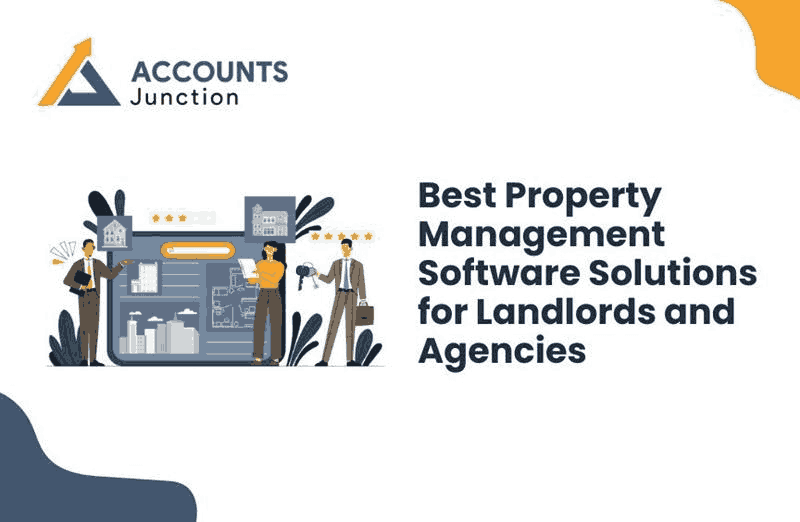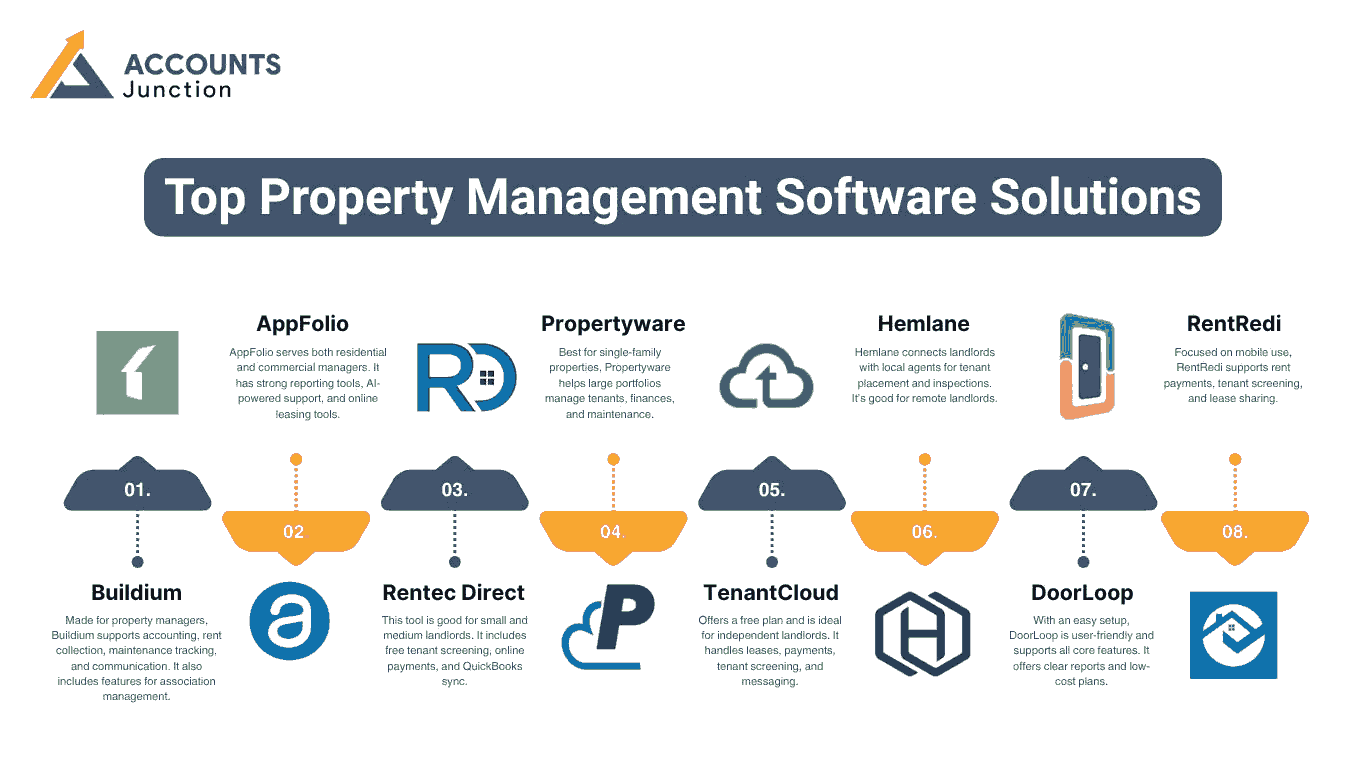
Best Property Management Software Solutions for Landlords and Agencies
Managing rental property is not easy. Landlords and property agencies have to deal with tenant issues, rent collection, maintenance, legal rules, accounting, and more. Doing all this by hand or on spreadsheets creates delays and leads to mistakes. This is where property management software makes a clear difference. It brings order, saves time, and gives real results.
This blog explains why landlords and property agencies should consider using property management software solutions. It also explores top features, common use cases, and how to choose the best option for your property business.
What Is Property Management Software?
Property management software is a tool designed to help landlords and agencies manage rental units from one place. It allows users to list properties, screen tenants, collect rent, track repairs, and manage financials.
Most property management software solutions work online, which means users can access data anytime, from anywhere. This makes it easy for landlords with many units or agencies with multiple clients to stay organized.
Why Landlords and Agencies Need It
Rental management involves a wide range of tasks. If not tracked properly, small mistakes turn into big losses. Here's how property management software helps fix this:
- Rent collection becomes automatic with online payment options
- Tenant screening is quicker and more reliable with built-in checks
- Lease tracking keeps contracts and renewals in order
- Expense recording supports better budgeting and tax filing
- Maintenance tracking ensures quick responses to tenant issues

Hire A Dedicated Team
That Grows With You, Flexible, Scalable and
Always On Your Side
Instead of doing these things through different apps or on paper, landlords and agencies can now manage everything in one place.
Key Features to Look For
Not all tools are equal. A good property management software should offer these core features:
1. Online Rent Collection
- The tool should support automatic rent payments, reminders, and payment tracking. This reduces delays and missed payments.
2. Tenant Portal
- Tenants should be able to log in to view leases, make payments, submit complaints, and track progress. This cuts down on back-and-forth calls and emails.
3. Maintenance Requests
- Tracking repair requests through the system helps landlords assign work orders fast and keep proof of completion.
4. Lease Management
- Built-in tools for lease creation, digital signing, and renewal notices help stay organized and avoid legal risks.
5. Accounting Integration
- It should support expense logging, rent roll reports, tax reports, and possibly link with popular accounting tools. This helps users keep books accurate without needing extra steps.
6. Document Storage
- The software should offer secure cloud storage for contracts, ID proofs, inspection reports, and other records.
7. Mobile Access
- A mobile app or mobile-friendly design helps landlords and tenants manage things on the go.
Types of Users Who Benefit
Property management software solutions work for many types of users. Each gains value in different ways:
Landlords with Few Properties
They get a simple system to track income, store records, and avoid paperwork. Even for 2 or 3 units, it saves effort.
Mid-size Property Owners
Owners with 10 to 50 units need help with lease tracking, payments, and tenant support. The software removes manual work and lowers stress.
Property Management Agencies
Agencies handling many clients or hundreds of units benefit the most. They need organized workflows, staff access levels, client reports, and batch actions.
Vacation or Short-term Rental Hosts
Even hosts on platforms like Airbnb or Vrbo can use property management software to sync bookings, manage cleaning, and track expenses.

Top Property Management Software Solutions
Here are some of the most trusted property management software solutions for landlords and agencies:
1. Buildium
- Made for property managers, Buildium supports accounting, rent collection, maintenance tracking, and communication. It also includes features for association management.
2. AppFolio
- AppFolio serves both residential and commercial managers. It has strong reporting tools, AI-powered support, and online leasing tools.
3. Rentec Direct
- This tool is good for small and medium landlords. It includes free tenant screening, online payments, and QuickBooks sync.
4. Propertyware
- Best for single-family properties, Propertyware helps large portfolios manage tenants, finances, and maintenance.
5. TenantCloud
- Offers a free plan and is ideal for independent landlords. It handles leases, payments, tenant screening, and messaging.
6. Hemlane
- Hemlane connects landlords with local agents for tenant placement and inspections. It’s good for remote landlords.
7. DoorLoop
- With an easy setup, DoorLoop is user-friendly and supports all core features. It offers clear reports and low-cost plans.
8. RentRedi
- Focused on mobile use, RentRedi supports rent payments, tenant screening, and lease sharing.
All these tools fall under property management software, but each serves slightly different users. Choosing the right one depends on property type, portfolio size, and team needs.
How to Choose the Right Property Management Software
With so many options, picking the right software can feel hard. Here’s how to narrow it down:
1. Know Your Property Type
- Some tools work best for multi-family buildings. Others are better for single-family homes, commercial units, or short-term rentals.
2. Estimate the Property Count
- If you manage 5 properties or less, choose simple software. If you manage over 50 units, look for tools with bulk features, automated workflows, and team logins.
3. Set a Budget
- Many software tools charge per unit per month. Free plans work for small landlords, while paid plans offer more depth.
4. Check for Mobile Use
- Make sure tenants and landlords can use the tool from a phone or tablet without issues.
5. Read User Reviews
- Go through what users say about support, bugs, or billing. Reviews give insights not shown on sales pages.
6. Ask for a Demo
- Most tools offer a free trial or demo. Try it before buying.
Benefits of Using Property Management Software
The use of property management software solutions brings measurable benefits. Here’s how:
Better Organization
All records, leases, and tenant info are in one place. No lost papers or missed updates.
Time Saved
Tasks that used to take hours now take minutes. For example, rent collection and reminders happen automatically.
Reduced Errors
Manual tracking leads to missed rent or wrong balances. Software calculates and updates figures with accuracy.
Clear Communication
Messages, notices, and alerts stay within the platform. Both landlords and tenants can view them anytime.
Easier Tax Filing
With ready reports and digital receipts, tax time becomes less stressful.
Scalable Operations
As property numbers grow, software helps you grow too. You don’t need to change systems.
Common Use Cases
To understand the practical value, consider how different users apply property management software:
Case 1: A Landlord with 8 Units
- He uses the tool to track rent due, auto-send reminders, and schedule repairs. It also keeps digital copies of each signed lease.
Case 2: A Real Estate Agency
- The agency has 150 rental units under management. Staff have access to the system. Owners get monthly reports. Tenants pay rent online and request maintenance through the app.
Case 3: A Landlord Living Abroad
- The landlord owns a few homes in the US but lives overseas. The tool helps screen tenants, collect rent, and hire local contractors. All updates are tracked online.
Questions to Ask Before You Subscribe
Make a checklist before paying for any property management software:
- Does it support online payments?
- Can I track expenses and income easily?
- Are tenant screening services included?
- How is data backed up and secured?
- Can tenants access a support portal?
- Are there reports for taxes and income?
- Is customer support responsive?
If the tool checks these boxes, it's likely a good fit.
Conclusion
Rental property management can be made simpler. With the right property management software, landlords and agencies can run operations with clarity, speed, and control. From rent tracking to maintenance and finance, software helps you stay on top without being tied to your desk.
Pick a system that fits your size, goals, and budget. Try a few, compare features, and read reviews. The time saved and mistakes avoided will repay your costs fast. Accounts Junction, we help you manage your property with the best suited software.
Whether you own two homes or manage hundreds of units, our property management software solutions change your daily system, helping you serve tenants better and keep your records clean.
FAQs
1. Can property management software be used for short-term rentals?
- Yes. Many tools offer features like calendar sync, guest messages, and cleaning schedules that suit short-term rentals.
2. Is property management software worth it for a landlord with only one property?
- Yes. Even single-property landlords benefit from payment tracking, lease storage, and maintenance logs.
3. Does the software support multiple users?
- Most tools support admin roles, team logins, and access settings for large teams or agencies.
4. Can tenants pay through credit or debit cards?
- Yes. Most tools allow online rent payments via cards or bank transfer. Some may charge a fee for card payments.
5. Is training required to use these tools?
- No. Most property management software solutions are designed to be easy to use. Some tools offer video guides or support chat.
6. How does the software handle late rent?
- It can send automatic reminders, charge late fees, and generate payment history reports for follow-ups.
